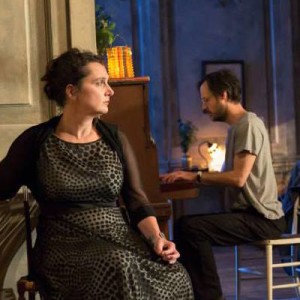The Cherry Orchard, Young Vic
 For a play in which inertia, atrophy, indecision, and the inability to move forward are key elements – aren’t they always in Chekhov – Katie Mitchell’s marvelously busy and concentrated staging of The Cherry Orchard fair zips along. In Simon Stephens’ punchy and highly contemporary translation the comedy is kept sharp and buoyant and immediate and most importantly – desperate; trivial diversions, awkward and embarrassing, the worst kind of small talk, become the tools of prevarication. While all around the emotional depth-charges go off: the drowned boy, the unrequited love, cold, waste, and poverty.
For a play in which inertia, atrophy, indecision, and the inability to move forward are key elements – aren’t they always in Chekhov – Katie Mitchell’s marvelously busy and concentrated staging of The Cherry Orchard fair zips along. In Simon Stephens’ punchy and highly contemporary translation the comedy is kept sharp and buoyant and immediate and most importantly – desperate; trivial diversions, awkward and embarrassing, the worst kind of small talk, become the tools of prevarication. While all around the emotional depth-charges go off: the drowned boy, the unrequited love, cold, waste, and poverty.
Writ large in this Cherry Orchard is the central idea that we are all to some extent architects of our own destiny and that Ranevskaya – in a pitch-perfect performance from Kate Duchene – is an irresponsible dreamer, a die-hard aristocrat, wedded to the past, nostalgic about even its tragedies, and stupidly insistant that the old values still hold true in a changing social and political landscape. It is the supreme irony of the play that the one person showing her a way out of her predicament – the working class boy made good Alexander Lopakhin (Dominic Rowan) – is her nemesis in waiting. His ultimate betrayal is but one of a series of cruelties that Mitchell addresses unflinchingly. The last of them is the humiliation of Varya (the heartbreaking Natalie Klamar) whose delusion (fueled by Ranevskaya) that she might make Lopakhin a good wife is dashed in the most dismissive way imaginable.
The estate itself – or rather the interior of the once grand house – tells its own story, of course, and Vicki Mortimer’s set, chillingly lit by James Farncombe, is a veritable museum of decay. The chill of decomposition is tangible. There is a marvellously disorientating moment where the shutters are wound open to admit sunlight just as Ranevskaya and her retinue are retiring to bed. Inside these walls, with the shutters drawn, it is eternal night.
Indeed when we enter this thrillingly versatile space a single rake of seats face towards a black void. The masking – like so much Mitchell – is highly cinematic with the black front cloth briefly lowered and raised between acts as the sound of the railway thunders by. These moments are like filmic “wipes” and in the last of them (and what a theatrical coup) the interior of the Ranevskaya household is stripped bare in seconds. All that remains, once these directionless characters have ceased their busyness and aimless rushing about and finally shut the door on an unfulfilled past, is the faithful old servant, Firs – discarded, forgotten, essentially buried alive. There is no more bitter pay-off in classic Russian drama than this.
Photo by Stephen Cummiskey — at Young Vic Theatre.


